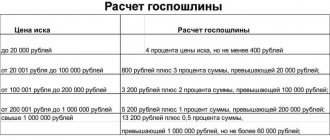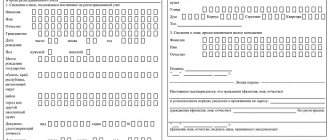Home / Real estate / Housing rights / Registration / Temporary registration at the place of stay
Back
Published: September 30, 2017
Reading time: 7 min
0
313
When deciding on housing in which you can temporarily register, you need to know about some features. For example, registration in a municipal apartment differs from registration in your own real estate.
- Features of registration in municipal housing
- Temporary registration in a communal apartment
- Registration in a rented apartment
- Is registration possible if the apartment has a mortgage?
- Registration in a private house
- Is it possible to check in at the apartment?
- Temporary registration in non-residential premises
A long-term stay away from your place of permanent residence requires you to apply for temporary registration. This obligation is imposed on citizens who have left their home region. The move may be due to studying in another city, the need for medical procedures, or simply relaxation.
Consequently, a rented apartment, sanatorium, hotel, hostel, etc. can serve as a place of stay. In any case, if you are in one of these places for more than 90 days, you must notify the migration service about this. Failure to comply with this obligation will result in a fine.
Features of registration in municipal housing
Anyone wishing to obtain temporary registration in an apartment that is not privatized must obtain written consent from a number of persons.
The first is the citizen in whose name a social rental agreement has been concluded, and then every adult who has a residence permit at this address.
An important feature of registration in such housing is noted in Article 80 of the Housing Code. It states that the maximum registration period can be 6 months. Temporary registration cannot be issued without the consent of the municipality, which is the landlord.
Depending on the area of the property and the number of people registered there, the municipality draws conclusions about compliance with living space standards for each of them.
And if there are not enough square meters, the landlord may refuse to register a new resident in this territory.
The national average is 12 sq. m per person, but this figure may vary by region. Registration of municipal real estate entails the need to submit a rental agreement to the Federal Migration Service.
Why are there more and more people without “registration”?
A number of legislative aspects also contribute to the increase in the number of people without “registration”. For example, you can be left without a place of registration on the initiative of a government agency. The authorities resort to this measure of influence in the fight against “rubber” apartments. Moreover, having lost registration in such an apartment, a person will be brought to administrative and even criminal liability.
READ ON THE TOPIC:
The dacha amnesty will be extended for another three years: why and who needs the amnesty?
Many Russians constantly live in their dachas.
The inability to register for them is also the reason for the increase in people without “registration”. Formally, it is already possible to register at a dacha, but the procedure remains complicated; registration will have to go through the court. The growth of the market for apartments, which also cannot provide their owner with permanent registration. It should be noted that we are not talking about homeless people at all. Many people without registration are renters. In Russia there is no habit of registering tenants in apartments. Many of them are people who live with relatives who do not want to register them with them, in privatized hostels.
Recently, another category of people without “registration” has appeared - these are families whose apartments were taken away for non-payment of the mortgage. And this is the most affected category of people. Without an address, they end up not only on paper.
There are also many people in Russia who have permanent registration, but it does not coincide with their actual place of residence. And they face many challenges in the region where they are located.
Temporary registration in a communal apartment
A feature of a communal apartment is the division of its territory into the personal property of each resident and the common territory to which everyone who lives there has the right, for example, a bathroom, kitchen, corridor.
Registration is not carried out in a common area, but in someone’s personal room.
In accordance with Article 42 of the RF Housing Code, a privatized room in a communal apartment is equivalent to a separate owned apartment.
On this basis, its owner, if he wants, can register any person there without requiring the consent of persons living in the neighborhood. The only person who needs to obtain consent in this case is other persons who have rights to the room.
Sometimes in the process of privatization, a communal apartment acquires the status of shared ownership. And you can register someone in such an apartment subject to the consent of each owner.
It is important to know that the consent of other citizens registered there (with the exception of owners) is not required in this case - this is stated in Article 247. Civil Code of the Russian Federation. A communal apartment may be owned by the state. Then it is impossible to do without the consent of the municipal authorities and each registered citizen for registration.
The room is not privatized, which means it has a registration period limit of no more than six months. If the room is personal property, then when registering for temporary registration, you will need a property document, and if the property is municipal, then a social tenancy agreement.
Is it possible to live in an unsuitable place?
By law, no one can prohibit the owner from being in his own office , workshop, or garage around the clock. It’s another matter when his presence there creates discomfort for those around him. Then the neighbors can turn to representatives of the law with a request to sort out the situation. Although it is often difficult to prove the fact of residence, this is undertaken only for compelling reasons, for example, when illegal migrants or fugitive criminals have settled in the basement.
It is risky for a tenant to live in a non-residential property - problems with the authorities may arise. Especially if the lease agreement strictly states the needs for which square meters of space are allowed to be used. If it is discovered that the property is not being used for its intended purpose, the owner of the property has the right to terminate the contract unilaterally (read more about the rules for using non-residential real estate here, and in this article we talked about the intended use of non-residential premises).
Registration in a rented apartment
Temporary registration in a rented apartment is justified if the lease agreement is concluded for a period of more than three months.
If the tenant’s stay is short-term, then you can do without registration.
Submitting an application to the FMS requires the consent of each home owner, as well as everyone who has a residence permit there. Also, a lease agreement must be provided as a basis.
The presence of temporary registration does not entail the emergence of the right to dispose of real estate. But precisely because of the fear that the tenant will have some rights to housing, many owners refuse to provide temporary registration.
These fears are unfounded; a certificate of temporary registration gives the right only to temporary residence, and nothing more.
Accommodations
It would seem that now everything is simple: you register foreigners at the office and don’t worry about anything. However, we would like to clarify that in practice, the migration service most often refuses registration if the premises are not suitable for living in it. Be prepared to prove to the inspectors that all foreigners have sleeping places, the opportunity to go to the restroom, wash, etc.
The legislation does not put forward specific requirements for living conditions. The norms for the number of square meters per person were also abolished. But this is not a reason to abuse the new rules and register foreigners in an open-space office on the sofa. Even if the migration department allows such conditions (which is unlikely), foreign employees are unlikely to actually live in the place of such registration. And the actual stay of a foreigner at another address is a direct violation of the law!
If the notification of arrival indicates one address, but in fact the foreigner is staying at a different address, this automatically leads to the removal of the employee from the facility.
Is registration possible if the apartment has a mortgage?
An apartment purchased with a mortgage is not the property of the bank, but is pledged to it.
Therefore, in order to protect itself in the event of a client’s refusal to pay the debt, the credit institution provides in the agreement for the possibility of registration in the apartment of third parties.
But obstacles often arise with ongoing registration.
Temporary registration does not entail the emergence of rights to real estate, so it rarely raises concerns for the lender. However, when registering, you need to make sure that the bank gives its consent.
Who is responsible?
Responsibility for a foreign citizen on the territory of the Russian Federation lies with the receiving party, that is, the owner of the premises in which the foreigner is registered for migration. It is also worth noting that the owner of the premises in which the foreigner is not registered, but in fact resides, is also responsible for it.
The receiving party is obliged:
— Notify about the foreigner’s stay (register);
— Report if a foreign citizen has left (deregistered).
Do not neglect removing a foreigner from migration registration! If it is discovered that a foreigner has not been deregistered, but in fact no longer resides at the place of registration, the owner of the premises faces administrative liability and a fine of 250,000 rubles !
The employer, if he is not the receiving party (that is, does not register the foreigner at his address), is not obliged to monitor the registration of the foreign employee with migration registration. But we do not recommend leaving the situation to chance! If a foreigner detects problems with registration, the migration service automatically expels the citizen from the territory of the Russian Federation. Often such inspections end in the mass expulsion or deportation of employees, which negatively affects the work of the company in which these employees worked.
Registration in a private house
The legislation does not prevent temporary registration in a private home. However, there is an essential condition - the house must be intended for living.
That is why it is impossible to register in a house that is under construction. And the registration rules are the same as in the case of an apartment.
The first thing that is necessary is the consent of the owner, or owners, as well as those who have a residence permit there. And the package of documents, among other things, includes title documents not only for the building, but also for the plot of land on which it is located.
Is it possible to register there temporarily or permanently?
They cannot register a citizen either temporarily or permanently in non-residential premises . A complete list of places where legal permanent residence or temporary registration of an internal migrant is possible is listed in the annex to Resolution No. 713 of July 17, 1995.
According to the current Government Decree No. 47 of January 28, 2006, the place of registration must be officially considered residential. To do this, you will need to prove to the local municipality that it is suitable for habitation and that it complies with sanitary, epidemiological and hygiene standards. The decision to recognize the premises as residential is made by a special commission.
It was allowed to register and obtain permanent registration in a country house in 2013. To do this you definitely need:
- Strengthen the walls and foundation.
- Provide water and electricity.
- Equip a sewer system.
- Insulate.
After all these manipulations, you need to contact Rosreestr to register the building. And only with a certificate from Rosreestr does it make sense to go to the municipality to register registration at the dacha (read more about all the nuances of living in a non-residential premises and transferring it to residential premises in a gardening partnership here).
Important! In 99.9% of cases, permission to permanently register at a dacha has to be obtained through the court; without delay, it is given only to citizens who have nowhere else to register.
Is there a penalty for registering?
There is no punishment for registration in non-residential premises in Russian legislation because no one will register a citizen in such a place.
Is it possible to check in at the apartment?
Apartments are comfortable premises intended for living. For example, apartments can be found in specially created complexes that resemble ordinary residential buildings. Unlike standard apartments, they are not related to the country's housing stock. Their main drawback is the inability to register.
Find out what an auction for the right to conclude a land lease agreement is in our detailed article! Do you want to donate a plot of land with a house? Here is a list of all necessary documents.
Our article fully describes the procedure for donating a garden plot.
Note to the employer
An employer can enter into a lease agreement with a dormitory, hostel or other place of residence of foreigners and, on its own behalf, register foreign employees in these premises for migration purposes.
Thus, the employer organizes recreational facilities for its foreign employees in rented premises. Remember that a lease agreement must be concluded! This is what you will provide to the migration department as proof of the legality of foreigners’ stay at certain addresses.
Contact Lexintel specialists for advice: we will analyze your situation individually and advise you on the best way to deal with registering your foreign employees for migration registration.









